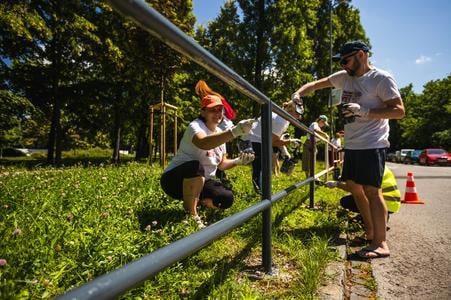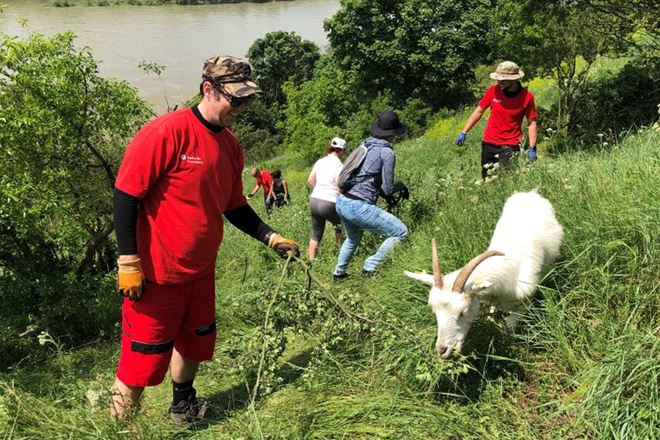Corporate social responsibility is not only about manual volunteering events such as painting fences or doing some cleaning. It is also about giving an expert helping hand to startups or helping people who are talented, but have special needs, to find a place in the labour market.
These activities have a multiplier effect, moving people in need forward and at the same time increasing employee engagement and pride in the company they work for.
“We care about the development of local communities,” says Lenka Adamčiak, Head of communications at Swiss Re Slovakia. “We are a long-term and reliable partner for them.” The Slovak Spectator spoke to Adamčiak about socially responsible business, the Shine programme, and promoting inclusion among employees.

What project did you enter for the Via Bona award this year?
For the Inclusive Employment Award, we entered a project led by three of our employee resource groups, each dedicated to fostering inclusion within our workplace. These include Younity, our Gen Z employee group, focused on helping young professionals integrate smoothly into the work environment and navigate corporate processes; the Parents at Swiss Re group which is creating a supportive community where colleagues can share the joys and challenges of balancing parenthood with their careers; and the Great Minds group which aims to raise awareness, provide education, and celebrate the unique talents and creativity that neurodivergent individuals bring to our teams.
Together, these groups drive our commitment to inclusivity by empowering diverse perspectives and creating spaces for meaningful connection and support.
Do Gen Z employees struggle to integrate into the workforce?
Generation Z, those born after 1996, represents a unique segment of the modern workforce. At our company alone they account for about 20 percent of our 2,500 employees – roughly 500 young people. Unlike previous generations, Gen Z has distinct workplace expectations. They prioritize flexibility, meaningful work, and community involvement.
As a large corporation, we understand that joining a structured, established organisation can be intimidating for young professionals. Concerns about rigid decision-making processes or a lack of dynamic work culture are common. However, within the Younity group, we strive to create an environment where Gen Z employees feel welcomed and supported. Our collaborative spaces and networking opportunities enable them to connect with colleagues, build relationships, and access information in ways that resonate with their learning styles.
By embracing their values and encouraging open communication, we aim to bridge generational gaps and ensure that our youngest team members thrive and contribute meaningfully to our collective goals.
What is the aim of the parents’ group?
Until now, Swiss Re did not have a dedicated community for families and parenting. While we have various interest groups – such as an Art Club, Running Club or community for environmental champions – there was a notable lack of a space for parents.
We recognised that the average age of our employees was rising – it is currently 36. This is a time in life when many people are starting families or already have young children. At any given time, we have over 200 employees on maternity or parental leave, with many more transitioning in and out of these life stages.
The Parents at Swiss Re group was created to fill this gap. Its mission is to provide education, support, and a community for parents within Swiss Re. We host monthly workshops and lectures covering a wide range of parenting topics while also highlighting the benefits Swiss Re offers to parents. One such benefit is a salary top-up during maternity or parental leave, which involves Swiss Re covering the difference between state benefits and the employee’s regular salary.
What is the focus of the Great Minds group?
We have found from widely available data that 15 -20 percent of people might be currently on the neurodivergent spectrum. This means they have some special talent or special need. This includes, for example, people with ADHD, dyslexia or dysgraphia. In the past, many neurodivergent individuals might have been excluded at some point during a job interview, but we do not see neurodivergence as a problem at all. We like to work with such people and we have a lot of them in the company, so it was natural for us to take up this topic and to spread awareness that these people are very talented and that they bring a different perspective to working life.
Although the project did not make it to the finals, we still have two other irons in the fire, so to speak. MannaFactory, which is a social enterprise that runs a bistro in our premises , and Parkan Crudes, which aims to produce sustainable insect protein for poultry using food waste from supermarkets, have both advanced to the final round. Parkan Crudes is the latest winning project in our Shine programme.
Could you tell us more about this programme?
Swiss Re in Slovakia
Swiss Re is one of the world’s leading providers of reinsurance, insurance and other forms of insurance-based risk transfer, working to make the world more resilient. They anticipate and manage a wide variety of risks, from natural catastrophes and climate change to aging populations and cybercrime. The Slovak branch was established in 2006 and with 2500+ employees it is currently the second largest location with various teams in IT, Finance, Asset Management, and Business Operations.
The Swiss Re Foundation’s Shine programme supports start-up entrepreneurs through grants and expertise, focusing on innovative solutions in two areas. The first of these is Climate solutions; the second is Access to health. It’s an opportunity for budding entrepreneurs to develop a sustainable business model and work on their processes and setups, but at the same time to grow in the desired area as well. Each year, we select one project from all submissions to receive a financial grant, but only after they undergo a fourmonth learning programme where our people work with them and share our know-how. To give a better idea, for example, our financiers help them to set up their business plan, or IT specialists help them create an application or website. It could be anything they need right now. We stay in touch with them even after the end of the programme, follow their journey and take great pride when they do well.
How much is the grant amount?
This year, the fifth year, it will be €40,000. The evaluation of the submitted projects is currently underway. The winner should be known by the end of May.
What projects have won so far?
Last year’s winner Parkan Crudes is on a mission to revolutionise the agricultural world by harnessing the power of black soldier fly larvae (Hermetia illucens) to munch on food waste and transform it into an organic fertilizer. Plus, dried and powdered larvae offer a sustainable, high-protein feed alternative for large-scale farms, backyard chickens, and pets. But for us the most successful project so far was the Dorka bags, which is an organisation from eastern Slovakia addressing homelessness through sustainable solutions. They recycle old advertising banners into bags and handbags with a story. The project was already functioning before they applied to our programme. But it was Shine that opened the way for them to move on. Thanks to us, also other companies approached them and had them make bags for their employees out of company banners. Today, you can buy their products in various chains. So, it had a multiplier effect.
What is Swiss Re’s ESG/CSR policy in Slovakia?
In terms of corporate social responsibility, it is a combination of global activities, which are driven by the Swiss Re Foundation, and local initiatives in Slovakia. These are based on a location strategy built on three pillars which are: employer of choice, industry leader and responsible company. Sustainability reporting takes place at a consolidated level globally – our subsidiary does not do the reporting for itself, but is part of the reporting for the entire group.
What specific corporate responsibility initiatives have you implemented?
One key initiative is Charity of the Year, where employees can nominate and then vote for a non-profit organisation to become our main partner for two years. We then organise with them our community days, and traditional charity run involving hundreds of our employees and family members. All the money raised from the event goes to the organisation. At the moment that organisation is the Bratislava Regional Conservation Association (BROZ). This year, Swiss Re also became partner of the Pohoda festival, where we support the so-called NGO passage and bring a valuable programme in the form of discussions and lectures. Another important project is the Bratislava Climathon, which is an urban hackathon helping Bratislava become a more attractive and resilient place. Swiss Re is a founding partner along with the city council and the Civitta organisation. Swiss Re provides financial input but our volunteers also help select topics to be tackled, serve as mentors for the competing teams and also are part of the jury.
Could you give us some examples of some important projects that have come out of this?
Last year, the Bratislava Re-use Centre KOLO got a comprehensive solution to sort through tens of thousands of old books handed in by people. The jury also really liked a project from high school students who had designed a method of presenting the city’s climate data in an easily-digestible form for future generations. We are currently discussing with the municipality how to help them implement these ideas in real life.
How do you encourage Swiss Re employees to become actively involved in these activities?
We are very fortunate in that our employees are naturally very curious and engaged, so we have no problem getting people involved in such activities. Early and good communication is key - letting them know what’s happening, when it’s happening, and what we need from them.
Do they come up with their own ideas too?
Very often, which is good because it leads to a greater willingness to participate in volunteering activities.
What are the latest trends in corporate responsibility in general?
A few years ago tree planting become a trend and this activity is still very popular in our company. We try, however, to bring a new activity every year as part of what we call community days. This year, for example, we are discussing the possibility of building tourist infrastructure, for example, building bridges on hiking trails, and shelters. In addition, we set ourselves the goal of raising awareness of expert volunteering, so our people could help organisations with their knowledge, whether it’s with creating a website or setting up a business model or some IT work.
Does Swiss Re measure the impact of its CSR activities in Slovakia?
Yes, we track the number of employees involved in volunteering. Last year it was 26 percent, about 570 of our employees, and the number is growing every year. We also measure the impact through our allied non-profit organisations and we regularly carry out employee surveys.
What are the biggest benefits to companies of volunteering?
Definitely greater employee engagement and a sense of belonging and pride. The employees also spread the good name of our company, which cares about the environment and the development of local communities, among their friends and relatives. These communities have a long-term and reliable partner in us.


 Swiss Re’s employees volunteer with the Bratislava Regional Conservation Association (BROZ). BROZ is behind the restoration of goatgrazing in Bratislava. (source: Swiss Re)
Swiss Re’s employees volunteer with the Bratislava Regional Conservation Association (BROZ). BROZ is behind the restoration of goatgrazing in Bratislava. (source: Swiss Re)